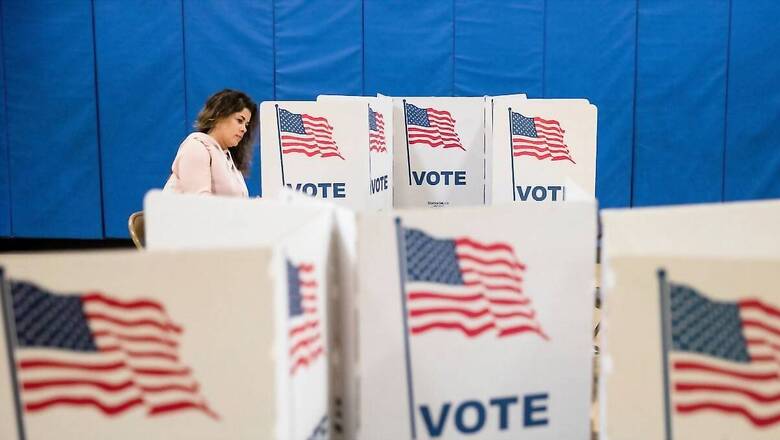
views
With the US Presidential Election 2024 just a few weeks away, on November 5, have you ever wondered how the candidates are chosen? There are “delegates” of national major party conventions who make that decision.
In a general election where candidates require the votes of the Electoral College to win the race to the White House, similarly, presidential candidates need a majority of delegate votes at the convention to get their nomination.
For 2024 elections, the race began in winter 2023. According to the Council on Foreign Relations, the US Presidential Election is “one of the most complex, lengthy, and expensive in the world”.
Who is a Delegate?
A delegate is a person chosen to represent their state or community at their party’s presidential nominating convention and select a candidate to represent their party on the November ballot. They are usually early supporters of a candidate, party activists or political leaders.
During the nomination process, each political party nominates a presidential and vice-presidential candidate who can win the General Election. The Presidency, and associated Vice-Presidency, represents the only nationally elected office and is a ‘big prize’ for each political party.
According to the US Constitution, each state has the right to legislate the selection process. Article 2, Section 1 of the Constitution states, “Each State shall appoint, in such Manner as the Legislature thereof may direct, a Number of Electors, equal to the whole Number of Senators and Representatives to which the State may be entitled in the Congress: but no Senator or Representative, or Person holding an Office of Trust or Profit under the United States, shall be appointed an Elector.”
In other words, the US President is elected by the Electors (or representatives) appointed by each state. Each state’s number of electors is identical to the number of its Senators and Representatives of the House.
What are the Types of Delegates?
The superdelegates are high-ranking officials who have yet to pledge their support to any candidate before they attend the national convention.
The Democratic party has “pledged” and “unpledged” delegates, and the Republican party has “bound” and “unbound” delegates.
Unpledged and unbound delegates can vote for any candidate regardless of their state’s primary or caucus results. These delegates usually don’t select candidates in the first round of voting in contested races.
How Many Delegates In Each Party?
In the Republican Party, superdelegates include the three members of each state’s national committee and have represented less than 5% of the party’s total delegates in 2020.
In the Democratic Party, superdelegates represent 15% of overall delegates. They are “members of the national committee, all members of Congress and governors, former presidents and vice presidents, former leaders of the Senate and the House, and former chairs of the Democratic National Committee”.
The Republican party had about 2,429 delegates in July for the Republican National Convention in Milwaukee, Wisconsin. Approximately 4,600 delegates were at the Democratic National Convention held in August in Chicago, Illinois.
To win the nomination, a Democratic candidate must have around 1,969 votes, and a Republican candidate must have at least 1,215.
How Republicans and Democrats Allocate Delegates?
A delegate chooses a candidate based on their performance in the state party’s primary election or caucus.
Republican party allocates delegates based on:
Proportional: Delegates are allocated proportionally to candidates based on the statewide vote.
Winner-take-all: All of a state’s delegates available in a contest are allocated to the candidate who receives the majority of votes in a state primary election or caucus.
Hybrid: Some states combine systems of delegate allocation. There are many versions, but the most common is majority-take-all, where delegates are won proportionally based on the statewide vote. Still, a candidate may win them all if they receive over 50% of the vote.
The Democratic party allocates delegates based on the statewide vote in primaries and caucuses. Candidates must receive at least 15% of the statewide vote to earn pledged delegates.
Who is Running for President?
Kamala Harris: The Vice-President from the Democratic party is a former prosecutor and senator of California. Biden stepped aside in July and backed his deputy to take over, giving her an unexpected shot at the White House. Initially, she was viewed by Democratic donors and supporters of Joe Biden as a potential political liability for addressing polarising and intractable issues like illegal migration and voting rights. But those concerns have eased. Harris is also advocating reproductive freedom to women as some states limit access to abortion. She also backs the freedom to vote and freedom from gun violence – while being a gun-owner herself.
Donald Trump: The former President is trying to win the White House he lost in 2020. He has denied inciting a mob of his supporters to attack the United States Capitol that year. During his presidency he tightened immigration, and cracked down on travel from several Muslim-majority countries and strengthened part of the southern border. If he beats Democratic Vice-President Kamala Harris, he would also make history as the oldest president, aged 82 at the end of his term. He is facing legal investigations from state authorities and the Justice Department alike.
Cornel West: A professor of philosophy at Union Theological Seminary, and who has taught at Yale, Princeton and Harvard, West is known for his progressive activism, including his criticism of Barack Obama. He said earlier that he would run with the People’s Party, a third party led by a former campaign staff member for Senator Bernie Sanders. But he subsequently said he would seek the Green Party’s nomination instead, and then switched again to run as an independent.
Jill Stein: Green Party candidate is a doctor and activist who ran for president on the Green Party ticket in 2012 and 2016. She called for an “economic bill of rights” that would include a guaranteed right to employment, health care, housing, food and education. Stein has seen growing support among Arab Americans and Muslims in battleground states like Michigan, Arizona and Wisconsin where they have large populations that helped propel President Joe Biden to victory in the 2020 election.
Chase Oliver: The 38-year-old political activist is a presidential nominee of left-leaning Libertarian Party that typically wins around 1% of the national vote and is known for promoting civil liberties and small government. A former Democrat, Oliver said he became politically active as an opponent of the Iraq War and describes himself as “armed and gay,”, as per The New York Times. At 38, Oliver is by far the youngest contender in this year’s election.




















Comments
0 comment